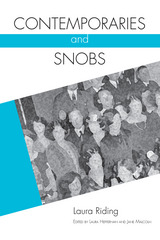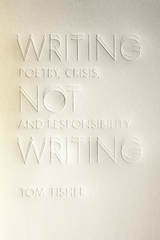2 books about Riding, Laura

Contemporaries and Snobs
Laura Riding
University of Alabama Press, 2014
This new edition of Contemporaries and Snobs, a landmark collection of essays by Laura Riding, offers a counter-history of high modernist poetics.
Laura Riding’s Contemporaries and Snobs (1928) was the first volume of essays to engage critically with high modernist poetics from the position of the outsider. For readers today, it offers a compelling account—by turns personal, by turns historical—of how the institutionalization of modernism denuded experimental poetry. Most importantly, Contemporaries and Snobs offers a counter-history of the idiosyncratic, of what the institution of modernism left (and leaves) behind. With Gertrude Stein as its figurehead, the book champions the noncanonical, the “barbaric,” and the undertheorized.
Riding’s nuanced defense of a poetics of the person in Contemporaries and Snobs represents a forgotten but essential first attempt to identify and foster what is now a well-defined poetic lineage that leads from Stein to the contemporary experimental avant-garde. In these essays, Riding takes her readers on a remarkably thorough tour through the critical scene of the 1920s. Among other influential treatises, she considers T. S. Eliot’s The Sacred Wood and his editorial essays in The Criterion, Allen Tate’s “Poetry and the Absolute,” John Crowe Ransom’s essays on the modernist poet, Edgell Rickword’s essays in The Calendar of Modern Letters, and Herbert Read’s posthumous publication of T. E. Hulme’s essays. All of this criticism, Riding notes, gave modern poets a sheen of seriousness and professionalism, but was it good for poetry? Her decisive answer is “no.” This new edition includes an introduction by Laura Heffernan and Jane Malcolm that makes legible the many connections between Contemporaries and Snobs and the critical debates and poetic experiments of the 1920s, as well as explanatory notes, a chronological bibliography of Riding’s work, and an index of proper names.
Laura Riding’s Contemporaries and Snobs (1928) was the first volume of essays to engage critically with high modernist poetics from the position of the outsider. For readers today, it offers a compelling account—by turns personal, by turns historical—of how the institutionalization of modernism denuded experimental poetry. Most importantly, Contemporaries and Snobs offers a counter-history of the idiosyncratic, of what the institution of modernism left (and leaves) behind. With Gertrude Stein as its figurehead, the book champions the noncanonical, the “barbaric,” and the undertheorized.
Riding’s nuanced defense of a poetics of the person in Contemporaries and Snobs represents a forgotten but essential first attempt to identify and foster what is now a well-defined poetic lineage that leads from Stein to the contemporary experimental avant-garde. In these essays, Riding takes her readers on a remarkably thorough tour through the critical scene of the 1920s. Among other influential treatises, she considers T. S. Eliot’s The Sacred Wood and his editorial essays in The Criterion, Allen Tate’s “Poetry and the Absolute,” John Crowe Ransom’s essays on the modernist poet, Edgell Rickword’s essays in The Calendar of Modern Letters, and Herbert Read’s posthumous publication of T. E. Hulme’s essays. All of this criticism, Riding notes, gave modern poets a sheen of seriousness and professionalism, but was it good for poetry? Her decisive answer is “no.” This new edition includes an introduction by Laura Heffernan and Jane Malcolm that makes legible the many connections between Contemporaries and Snobs and the critical debates and poetic experiments of the 1920s, as well as explanatory notes, a chronological bibliography of Riding’s work, and an index of proper names.
[more]

Writing Not Writing
Poetry, Crisis, and Responsibility
Tom Fisher
University of Iowa Press, 2017
The poet George Oppen comments, “There are situations which cannot honorably [be] met by art, and surely no one need fiddle precisely at the moment that the house next door is burning.” To write poetry under such circumstances, he continues, “would be a treason to one’s neighbor.” Committing himself, then, to more direct and conventional forms of response and responsibility, Oppen leaves poetry behind for twenty-five years. The disasters of the 1930s, for Oppen, put poetry into a fundamental question that could not be resolved or overcome. Yet if crisis is continual, then poetry is always turning away from the neighbor in need, always an irresponsible response in a world persistently falling apart.
Writing Not Writing both confirms this question into which crisis puts poetry and explores alternative modes of “response” and “responsibility” that poetry makes possible. Reading the silences of Oppen, Carl Rakosi, and Bob Kaufman, the renunciation of Laura Riding, and other more contemporary instances of poetic abnegation, Tom Fisher explores silence, refusal, and disavowal as political and ethical modes of response in a time of continuous crisis. Through a turn away from writing, these poets offer strategies of refusal and departure that leave anagrammatical hollows behind, activating the negational capacities of writing and aesthetics to disrupt the empire of sense, speech, and agency.
Fisher’s work is both an engaging and detailed analysis of four individual poets who left poetry behind and a theoretically provocative exploration of the political and ethical possibilities of silence, not-doing, and disavowal. In lucid but nuanced terms, Fisher makes the case that, from at least modernism forward, poetry is marked by refusals of speech and sense in order to open possibilities of response outside conventional forms of responsibility.
Writing Not Writing both confirms this question into which crisis puts poetry and explores alternative modes of “response” and “responsibility” that poetry makes possible. Reading the silences of Oppen, Carl Rakosi, and Bob Kaufman, the renunciation of Laura Riding, and other more contemporary instances of poetic abnegation, Tom Fisher explores silence, refusal, and disavowal as political and ethical modes of response in a time of continuous crisis. Through a turn away from writing, these poets offer strategies of refusal and departure that leave anagrammatical hollows behind, activating the negational capacities of writing and aesthetics to disrupt the empire of sense, speech, and agency.
Fisher’s work is both an engaging and detailed analysis of four individual poets who left poetry behind and a theoretically provocative exploration of the political and ethical possibilities of silence, not-doing, and disavowal. In lucid but nuanced terms, Fisher makes the case that, from at least modernism forward, poetry is marked by refusals of speech and sense in order to open possibilities of response outside conventional forms of responsibility.
[more]
READERS
Browse our collection.
PUBLISHERS
See BiblioVault's publisher services.
STUDENT SERVICES
Files for college accessibility offices.
UChicago Accessibility Resources
home | accessibility | search | about | contact us
BiblioVault ® 2001 - 2024
The University of Chicago Press









